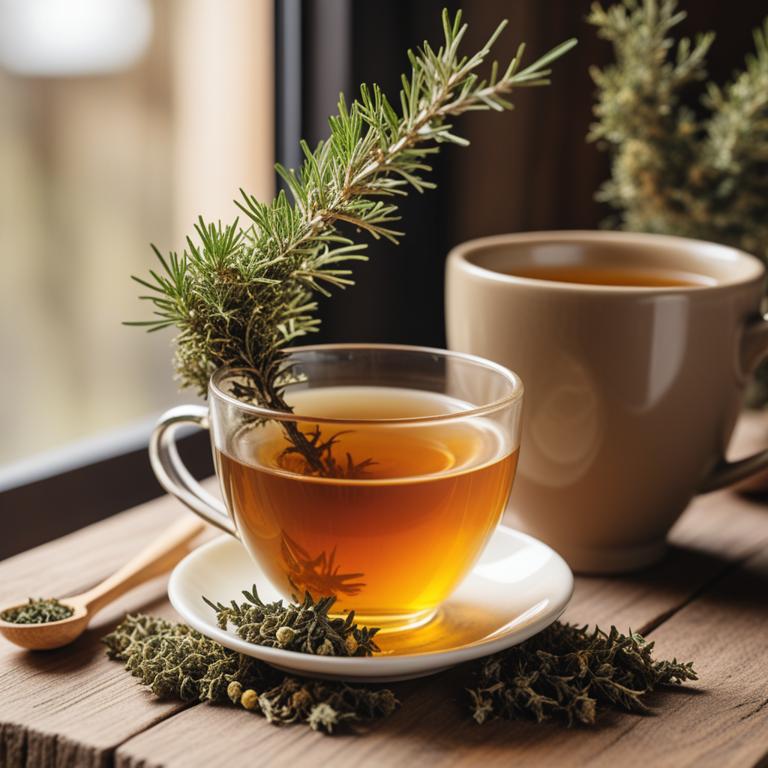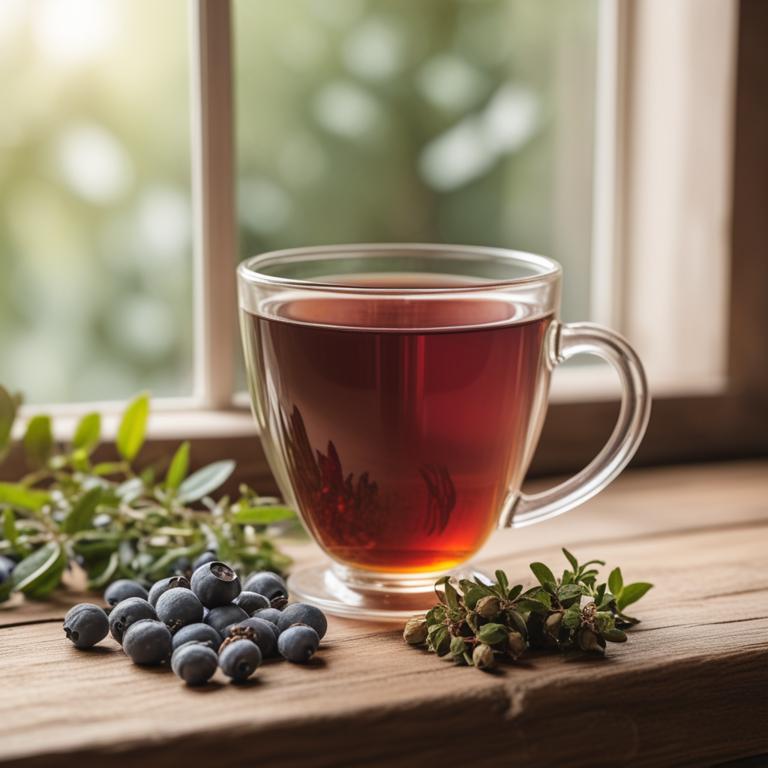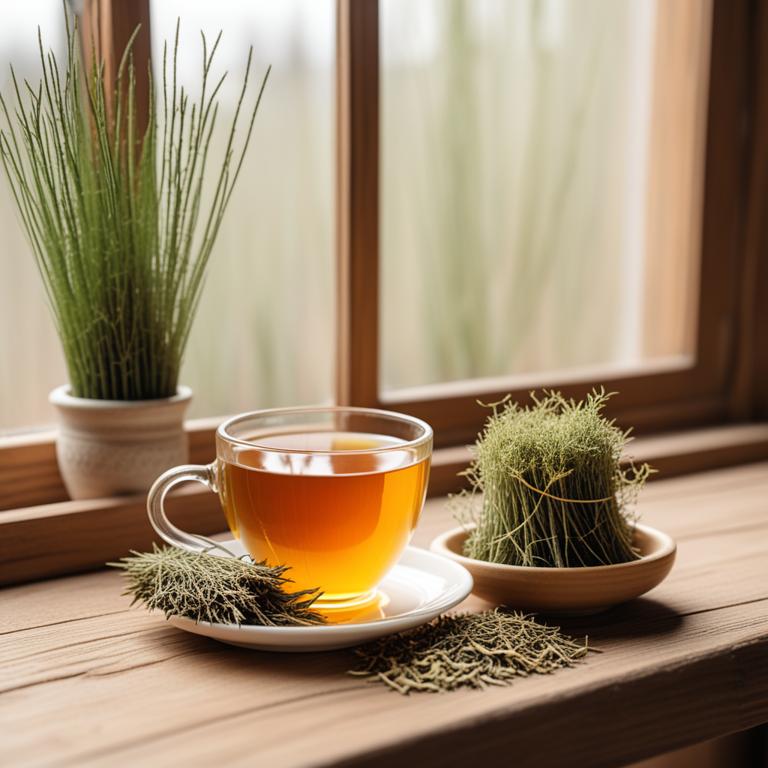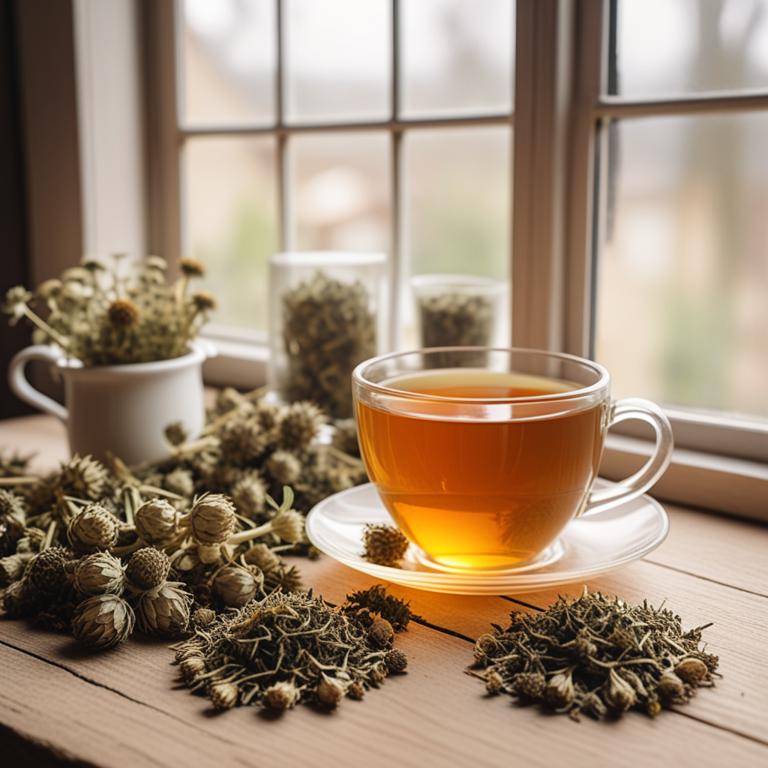11 Herbal Teas For Dysuria

Herbal teas can be a helpful remedy for dysuria, which is a painful or difficult urination.
Some herbs have anti-inflammatory properties that can help soothe the urinary tract and reduce discomfort. For instance, Glycyrrhiza glabra, also known as licorice root, has been used for centuries to treat various digestive issues, including dysuria. Its anti-inflammatory compounds can help calm the bladder and reduce inflammation, making it easier to urinate. Another herb that may help with dysuria is Urtica dioica, or stinging nettle. The root of this plant has been used to treat urinary issues, including incontinence and bladder problems. Urtica dioica contains compounds that can help reduce inflammation and improve bladder function, making it easier to urinate without pain or discomfort.
Sambucus nigra, or elderberry, is another herb that may help with dysuria. The flowers and berries of this plant have been used to treat various health issues, including urinary problems. Sambucus nigra contains compounds that can help reduce inflammation and promote healing in the urinary tract, making it easier to urinate without pain or discomfort. Drinking herbal teas made from these herbs can bring several benefits to your life. For one, it can help reduce the frequency and severity of painful urination, making it easier to go about your daily activities without discomfort. It can also help reduce the risk of complications, such as urinary tract infections, which can be painful and even life-threatening if left untreated.
By incorporating herbal teas into your daily routine, you may find that you're able to enjoy activities and hobbies that you previously avoided due to painful urination.
- 1. Glycyrrhiza glabra
- 2. Urtica dioica
- 3. Sambucus nigra
- 4. Zingiber officinale
- 5. Echinacea purpurea
- 6. Achillea millefolium
- 7. Cinchona officinalis
- 8. Vaccinium myrtillus
- 9. Equisetum arvense
- 10. Arctium lappa
- 11. Juniperus communis
1. Glycyrrhiza glabra

Glycyrrhiza glabra teas contains licorice root, which has been used for centuries to treat dysuria, a painful and frequent urination problem.
The tea is rich in glycyrrhizin, a triterpenoid saponin, and flavonoids like licochalcone A and B, which have anti-inflammatory properties. These compounds help reduce inflammation and irritation in the urinary tract, relieving pain and discomfort. Glycyrrhizin also has a soothing effect on the mucous membranes, helping to calm and protect them from further irritation.
By reducing inflammation and soothing the urinary tract, Glycyrrhiza glabra teas can help alleviate the symptoms of dysuria.
- Gather 2 teaspoons of dried Glycyrrhiza glabra roots.
- Boil 1 cup of water in a kettle or pot.
- Add the 2 teaspoons of dried roots to the boiling water.
- Reduce heat and let it simmer for 5-7 minutes.
- Strain the tea and drink 1 cup, 2-3 times a day.
2. Urtica dioica

Urtica dioica teas contains compounds like histamine, quercetin, and isothiocyanates, which are known to help alleviate symptoms of dysuria.
Histamine, a natural chemical in the body, can increase blood flow to the affected area, reducing inflammation and discomfort. Quercetin, a powerful antioxidant, has anti-inflammatory properties that can help soothe the urinary tract and reduce pain. Isothiocyanates, found in the roots of the plant, have been shown to have antimicrobial properties, which can help combat infections that may be causing the dysuria.
By consuming Urtica dioica teas, individuals may experience relief from the symptoms of dysuria, such as painful urination and discomfort.
- Gather 1 cup of fresh Urtica dioica leaves or 2-3 tablespoons of dried leaves.
- Combine the leaves with 1 cup of boiling water in a pot.
- Steep for 5-7 minutes, then strain the mixture.
- Discard the leaves and let the tea cool down.
- Drink 1/2 cup of the cooled tea 2-3 times a day for relief from dysuria symptoms.
3. Sambucus nigra

Sambucus nigra teas contains bioactive constituents like flavonoids, anthocyanins, and saponins that help with dysuria.
Flavonoids have anti-inflammatory properties that reduce swelling and ease discomfort in the urinary tract. Anthocyanins have antioxidant properties that help protect the bladder and urinary tract from damage. Saponins have antiseptic properties that help prevent infections that can cause dysuria.
By reducing inflammation, protecting the urinary tract, and preventing infections, Sambucus nigra teas can help alleviate symptoms of dysuria.
- Gather 2 tablespoons of Sambucus nigra flowers and 1 cup of boiling water.
- Steep the flowers in the boiling water for 5-7 minutes, then strain.
- Get a cup of cold water and add 1 teaspoon of honey (optional).
- Mix the steeped Sambucus nigra flowers with the cold water and honey (if using).
- Drink the tea 2-3 times a day for dysuria relief.
4. Zingiber officinale

Zingiber officinale teas contains a compound called gingerol, which is responsible for its medicinal properties.
The anti-inflammatory properties of gingerol help to soothe the urinary tract and reduce inflammation, making it easier to pass urine. The bioactive constituent, shogaol, also found in Zingiber officinale teas, has antimicrobial properties that help to eliminate bacterial infections, a common cause of dysuria. Additionally, the warming properties of ginger help to increase blood flow to the affected area, promoting healing and reducing pain.
By reducing inflammation and eliminating bacterial infections, Zingiber officinale teas can help to alleviate the symptoms of dysuria.
- Gather 1 tablespoon of dried Zingiber officinale (ginger) root and 1 cup of boiling water.
- Add the ginger root to the boiling water and let it steep for 5-7 minutes.
- Strain the mixture into a cup to remove the ginger root.
- Add honey or sugar to taste, if needed. The recommended amount is 1-2 teaspoons.
- Drink the tea 2-3 times a day, or as directed by a healthcare professional, to help manage dysuria symptoms.
Zingiber Officinale Tea on Amazon
FGO Organic Ginger Tea, 100 Count, Eco-Conscious Tea Bags, Caffeine Free, Packaging May Vary (Pack of 1)
Disclaimer: We earn a commission if you click this link and make a purchase at no additional cost to you.
5. Echinacea purpurea

Echinacea purpurea teas contains powerful compounds like alkylamides, phenolic acids, and glycosides that help with dysuria.
The alkylamides in Echinacea purpurea tea have anti-inflammatory properties, which reduce swelling and inflammation in the urinary tract, making it easier to urinate. The phenolic acids, such as chicoric acid and caftaric acid, have antimicrobial properties, which prevent bacterial infections that can cause dysuria. The glycosides in Echinacea purpurea tea also have soothing and calming effects on the urinary tract, reducing pain and discomfort associated with dysuria.
By reducing inflammation and preventing infections, Echinacea purpurea tea helps to alleviate the symptoms of dysuria.
- Gather 2 tablespoons of dried Echinacea purpurea flowers.
- Measure 1 cup of boiling water in a teapot.
- Add the 2 tablespoons of dried Echinacea flowers to the teapot.
- Let the mixture steep for 5-7 minutes, then strain the tea.
- Drink 1 cup of the Echinacea tea, 2-3 times a day, as needed for relief from dysuria.
6. Achillea millefolium

Achillea millefolium teas contains a mix of bioactive constituents such as flavonoids, sesquiterpenes, and essential oils, which contribute to its therapeutic properties.
The flavonoids, including rutin and quercetin, have anti-inflammatory and antioxidant effects, helping to reduce inflammation and irritation in the urinary tract. The sesquiterpenes, particularly achillin and santonin, possess antiseptic and antimicrobial properties, which aid in combating bacterial infections and promoting a healthy balance of gut flora. The essential oils, including camphor and borneol, help to relax the muscles and improve blood circulation, reducing the discomfort and pain associated with dysuria.
By addressing the underlying causes of dysuria, Achillea millefolium teas helps to alleviate symptoms such as burning sensation and frequency of urination.
- Gather 1 tablespoon of dried Achillea millefolium flowers.
- Put 1 cup of boiling water in a teapot.
- Add the dried flowers to the boiling water and let it steep for 5-7 minutes.
- Strain the tea into a cup and discard the flowers.
- Drink the tea 2-3 times a day to help alleviate dysuria.
7. Cinchona officinalis

Cinchona officinalis teas contains quinine, a key bioactive constituent that has anti-inflammatory and antiseptic properties.
These properties help to soothe and calm the urinary tract, reducing inflammation and discomfort associated with dysuria. Quinine also has a mild antiseptic effect, which helps to prevent bacterial infections and promotes healing in the urinary tract. Additionally, quinine has a mild astringent effect, which can help to reduce the frequency and urgency of urination, providing relief from dysuria.
By combining these properties, Cinchona officinalis teas can help to provide relief from the symptoms of dysuria.
- Gather 1 cup of boiling water, 1 teaspoon of dried Cinchona officinalis bark, and a tea infuser or strainer.
- Place the dried Cinchona officinalis bark in the tea infuser or strainer.
- Pour the boiling water over the bark and let it steep for 5-7 minutes.
- Strain the tea into a cup and discard the bark.
- Drink the tea 2-3 times a day as needed to help with dysuria.
8. Vaccinium myrtillus

Vaccinium myrtillus teas contains anthocyanins and other bioactive compounds that help alleviate dysuria.
These compounds have anti-inflammatory properties, which reduce swelling and irritation in the urinary tract. The flavonoids present in Vaccinium myrtillus teas also have antioxidant effects, protecting the bladder and kidneys from damage caused by free radicals. Additionally, Vaccinium myrtillus teas contains tannins, which have astringent properties that help reduce inflammation and soothe the urinary tract.
By reducing inflammation and protecting the urinary system, Vaccinium myrtillus teas can help alleviate symptoms of dysuria.
- Gather 1 cup of fresh Vaccinium myrtillus leaves and flowers, or 1 teaspoon of dried leaves and flowers.
- Combine the Vaccinium myrtillus with 1 cup of boiling water in a heat-resistant cup.
- Steep the mixture for 5-7 minutes, then strain it using a fine-mesh sieve or cheesecloth.
- Discard the solids and add honey or sugar to taste, if desired. You can also add 1/2 cup of apple juice for flavor.
- Drink 1 cup of the tea 2-3 times a day to help relieve dysuria symptoms.
9. Equisetum arvense

Equisetum arvense teas contains compounds like equisetic acid, isorhapontigenin, and caffeic acid.
These bioactive constituents have anti-inflammatory and antioxidant properties that can help reduce swelling and pain associated with dysuria, a painful urination condition. The tea's flavonoids and phenolic acids also have a soothing effect on the urinary tract, which can help alleviate symptoms such as burning and discomfort during urination. Additionally, Equisetum arvense has a diuretic property that can help increase urine production, which may help flush out bacteria and reduce the risk of infection that can cause dysuria.
This natural remedy has been used for centuries to help alleviate symptoms of dysuria, and its bioactive compounds may contribute to its effectiveness in soothing and protecting the urinary tract.
- Gather 1 cup of fresh or dried Equisetum arvense (horsetail) root or stem, or 2 tablespoons of dried root or stem in powder form.
- Use a cup or a teapot to boil 2 cups of water.
- Add the gathered Equisetum arvense to the boiling water and let it steep for 5-10 minutes.
- Strain the liquid into a cup and discard the solids. Add honey or sugar if desired for taste.
- Drink the Equisetum arvense tea 2-3 times a day to help with dysuria. Consult a doctor before using any herbal remedy.
10. Arctium lappa

Arctium lappa teas contains inulin, mucilage, and phenolic acids.
These bioactive constituents have anti-inflammatory and soothing properties that can help ease the discomfort of dysuria, or painful urination. The mucilage in Arctium lappa teas forms a protective barrier on the urinary tract, reducing inflammation and irritation that can cause pain. Inulin, a type of soluble fiber, also has a soothing effect on the urinary tract, helping to calm irritation and inflammation.
By reducing inflammation and providing a soothing effect, Arctium lappa teas can help alleviate the symptoms of dysuria.
- Gather 1 cup of dried Arctium lappa root, 2 cups of water, and a tea infuser or strainer.
- Place 1-2 teaspoons of dried root in the tea infuser or strainer.
- Heat the water in a pot and bring it to a boil.
- Pour the boiling water over the dried root in the tea infuser or strainer.
- Steep for 5-7 minutes, then strain and drink 1-2 cups of the tea 2-3 times a day for dysuria relief.
11. Juniperus communis

Juniperus communis teas contains a compound called terpinen-4-ol, which has been shown to have anti-inflammatory properties that help soothe the urinary tract and reduce discomfort.
The flavonoids present in the tea, including kaempferol and quercetin, have antioxidant properties that help protect the bladder and urethra from damage caused by inflammation and infection. Juniperus communis teas also contains sesquiterpenes, particularly beta-caryophyllene, which has anti-inflammatory and antimicrobial properties that help combat bacterial infections that can cause dysuria. The diuretic properties of juniper berries, which are a key component of the tea, help increase urine production and flush out bacteria and other irritants that can cause discomfort.
By addressing the underlying causes of dysuria, Juniperus communis teas may help alleviate symptoms such as burning and pain during urination.
- Gather 1 cup of fresh or dried Juniperus communis berries.
- Combine the berries with 2 cups of water in a saucepan.
- Bring the mixture to a boil, then reduce heat and let it simmer for 10 minutes.
- Strain the mixture through a cheesecloth or a fine-mesh sieve into a cup.
- Drink 1/2 cup of the tea 2-3 times a day to help relieve dysuria.